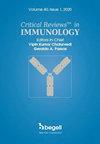Increased PKN2 and M2-polarized macrophages promote HCT116 cell invasion
IF 0.9
4区 医学
Q4 IMMUNOLOGY
引用次数: 0
Abstract
Backgroud: Colorectal cancer is the third most common malignant tumor, with highly invasive and metastatic potential in the later stage. This study investigated the role of PKN2 overexpression and M2-polarized macrophages in dictating the malignant phenotype of colorectal cancer cells. Methods: HCT116 colorectal cancer cell line with PKN2 overexpression was generated to investigate the functional role of PKN2. THP-1 cells were polarized into M2-like macrophages, and the co-culture system of THP-1/M2 cells and HCT116 cells was established to examine the impacts of M2-polairzed macrophages on the malignant phenotype of colorectal cancer cells. Results: PKN2 overexpression promoted cell proliferation, migration and invasion in HCT116 colorectal cancer cells, and reduced spontaneous cell death in the cell culture. Besides, the presence of M2-polarized THP-1 cells significantly enhanced the aggressive phenotype of HCT116 cells. Both PKN2 overexpression and M2-polarized THP-1 cells increased the expression of NF-κB p65 in HCT116 cells, indicating that enhanced NF-κB signaling may contribute to the augmented aggressiveness of HCT116 cells. Conclusion: These findings suggest PKN2 as an oncogenic factor in colorectal cancer and that M2-polarized THP-1 cells may promote the progression of colorectal cancer by activating NF-κB signaling.PKN2 和 M2 极化巨噬细胞的增加促进了 HCT116 细胞的侵袭
背景介绍结直肠癌是第三大常见恶性肿瘤,后期具有高度侵袭性和转移性。本研究探讨了 PKN2 过表达和 M2 极化巨噬细胞在决定结直肠癌细胞恶性表型中的作用。将THP-1细胞极化为M2样巨噬细胞,建立THP-1/M2细胞与HCT116细胞共培养系统,研究M2极化巨噬细胞对结直肠癌细胞恶性表型的影响:结果:PKN2的过表达促进了HCT116结直肠癌细胞的增殖、迁移和侵袭,并减少了细胞培养中的自发死亡。此外,M2极化的THP-1细胞的存在显著增强了HCT116细胞的侵袭表型。PKN2过表达和M2极化的THP-1细胞都增加了HCT116细胞中NF-κB p65的表达,表明NF-κB信号的增强可能是HCT116细胞侵袭性增强的原因之一:这些研究结果表明,PKN2是结直肠癌的致癌因子,M2极化的THP-1细胞可能通过激活NF-κB信号促进结直肠癌的进展。
本文章由计算机程序翻译,如有差异,请以英文原文为准。
求助全文
约1分钟内获得全文
求助全文
来源期刊
CiteScore
2.60
自引率
0.00%
发文量
14
审稿时长
>12 weeks
期刊介绍:
Immunology covers a broad spectrum of investigations at the genes, molecular, cellular, organ and system levels to reveal defense mechanisms against pathogens as well as protection against tumors and autoimmune diseases. The great advances in immunology in recent years make this field one of the most dynamic and rapidly growing in medical sciences. Critical ReviewsTM in Immunology (CRI) seeks to present a balanced overview of contemporary adaptive and innate immune responses related to autoimmunity, tumor, microbe, transplantation, neuroimmunology, immune regulation and immunotherapy from basic to translational aspects in health and disease. The articles that appear in CRI are mostly obtained by invitations to active investigators. But the journal will also consider proposals from the scientific community. Interested investigators should send their inquiries to the editor before submitting a manuscript.

 求助内容:
求助内容: 应助结果提醒方式:
应助结果提醒方式:


